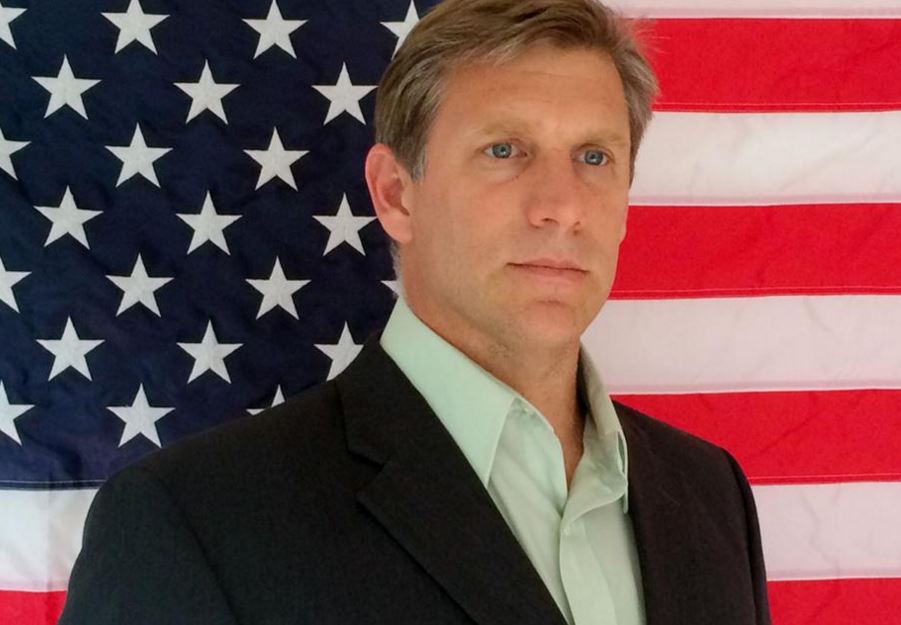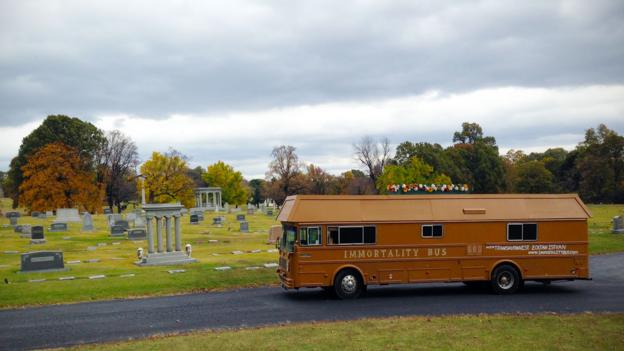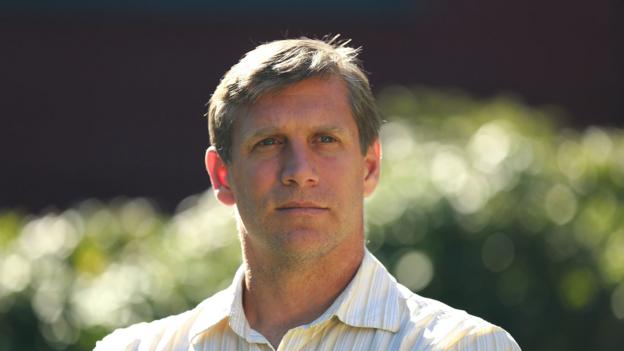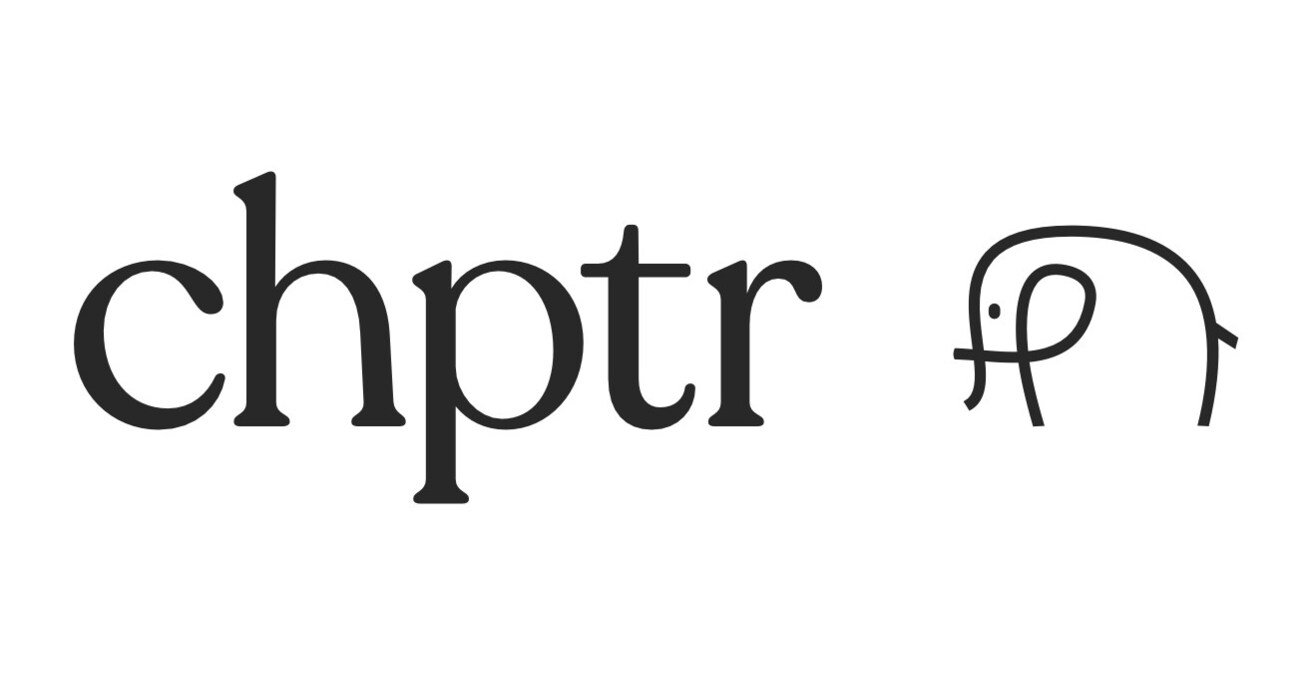Meet Zoltan, the presidential candidate who drives a coffin
Article originally appeared on BBC
Not many politicians running for the White House promise to end death. But not many politicians are Zoltan Istvan. Tim Maughan meets a man travelling America in a giant coffin-shaped bus to make his point.
“I had been working for National Geographic, travelling, doing all these fun things and then all of a sudden, I nearly stood on a land mine in Vietnam,” Zoltan Istvan tells me, as we sit in the lobby of a hotel just a few minutes walk from the White House. “My guide tackles me, throws me down, and saves my life. It was then that I decided that it was time to really dedicate myself to stopping death – stopping death for me, and stopping death for my loved ones.”
So goes the dramatic origin story of one of the most unusual candidates in the 2016 race to be president of the United States.
Amid the rolling election coverage, the social media jabs between Donald Trump and Jeb Bush, and the debate sparring of Hillary Clinton and Bernie Sanders, Istvan has been staging a rather unusual campaign as a third party candidate. This writer, philosopher and futurist is running for the Transhumanist Party, a movement that believes technology has the power to transform the human mind and body.
Istvan is currently touring the US in what he calls the “Immortality Bus”: an old school bus converted to look like a huge coffin on wheels and paid for by an online crowdfunding campaign. He’s doing this to spread his vision of transhumanism, and so far it seems to be paying off – he openly admits the bus is a stunt, but it has been winning him the news coverage he seeks. But back in early August before the tour had kicked off, and the bus was still on the drawing board, I spent a day in Washington DC with Istvan to try to find out what he really believes in, how serious he is about it all, and what he sees in America’s future.
The plan is to join Istvan at his hotel at 9:30 in the morning, but I’ve come to DC on an early flight from New York, and I arrive an hour ahead of our meeting. I grab a coffee and sit in the lobby, when I notice Istvan is already here. At first I’m not sure it’s him – we’ve never met before but I’ve seen photos of him online, and he’s a striking figure: white, tall, muscular, healthy, with blond hair and blue eyes. There’s little denying that he looks stereotypically ‘all-American’, like the physical embodiment of the Californian, libertarian, start-up culture tech-utopian dream. In his publicity photos he looks like the transhumanist movement’s ideals made flesh.
But, arriving early and unannounced, that’s not the Zoltan Istvan I spot in the hotel lobby. Instead he looks a little disheveled and tired, like he’s just woken up, wearing a scruffy t-shirt and faded jeans. His hair is a bit of a mess. As he anxiously fidgets with his smartphone the air of confidence projected by his publicity shots is gone, replaced instead with a sense of stress and nervous energy, something that will emerge repeatedly throughout the day. It is, to be frank, far more relatable than his presidential persona. The transhuman is, for now at least, very clearly still human.
I don’t approach him, suddenly feeling like I’d be intruding on his personal space. Instead I keep my distance and wait, and soon enough he disappears back to his room and reappears before me as his more expected public persona. He’s friendly and enthusiastic, and before long he’s telling me about his background, and how he got involved in the transhumanist movement.
The son of Hungarian immigrants to the US, Istvan was working as a journalist when he nearly stood on that land mine in Vietnam. “I’d been involved in environmental stuff. I’d been doing good humanitarian work. I felt good about my life, but I was not dedicated to the field that I really was interested in. It had a lot to do with also being through with being a journalist. Not completely through, but just through with covering other stories and not the real story I wanted, which was, ‘What kind of science can make people live longer?’
“After that, I felt like a philosophical bomb went off in my head and I thought, ‘Hey, I should use whatever skills I have to contribute to this movement. I almost just died. This movement’s about not dying basically, in many ways. Maybe I should do something for it.’”
Istvan quit journalism, and instead threw himself in to writing a novel, The Transhumanist Wager. “That took about four, five full years. I worked on my novel eight hours a day for four years straight. I didn’t have a day job. I just did the novel.”
The Transhumanist Wager tells the story of Jethro Knights, a philosopher who rails against democratic politics and becomes a revolutionary that seizes control of the world in order to enforce a global authoritarian transhuman regime. It sounds a little like theneoreactionary movement, I suggest, the far-right philosophical movement that believes democracy has failed, and that nations should once again be run by hereditary monarchies. Isn’t that perhaps a worrying storyline from someone running as president?






